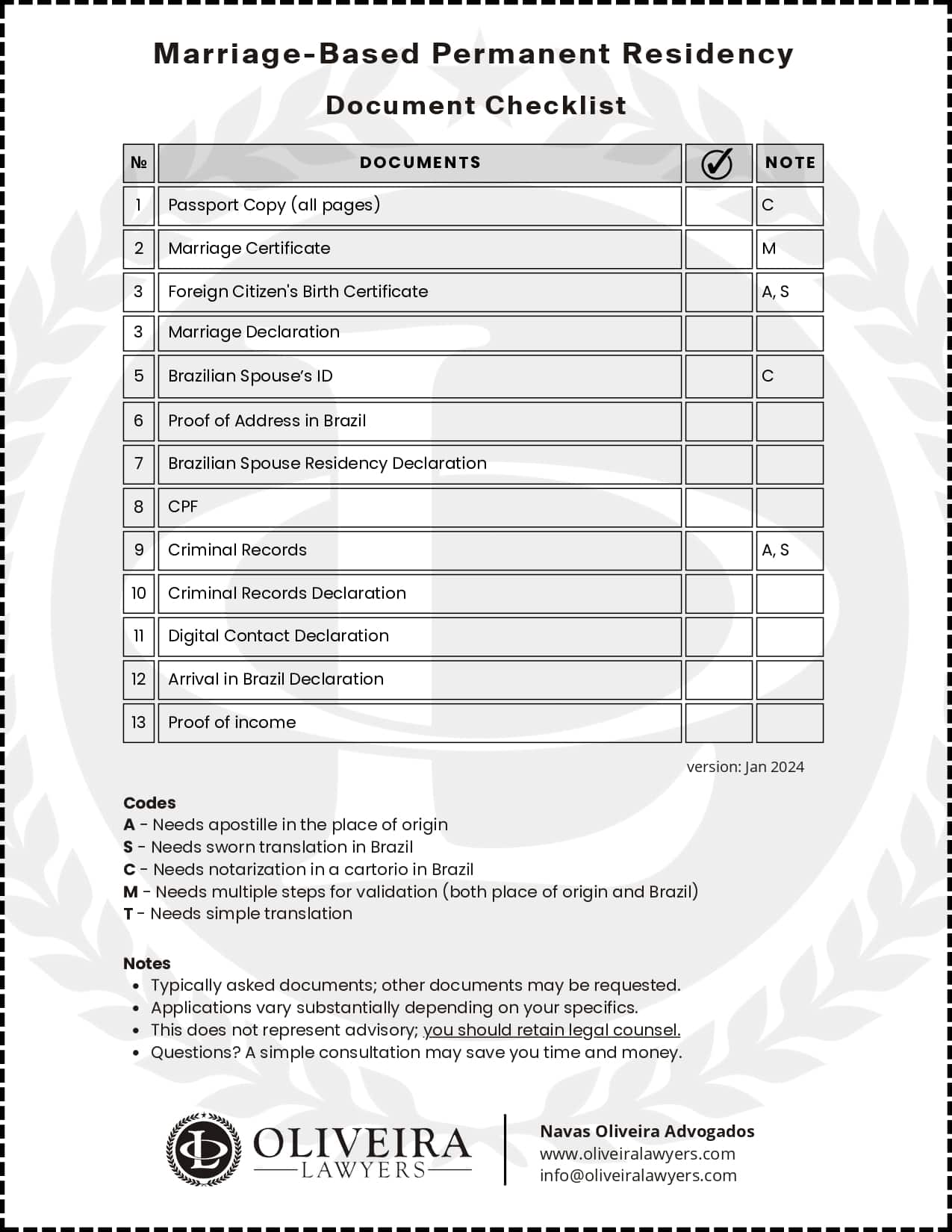Permanent Residency in Brazil for Foreign Nationals Through Marriage

Welcome to the most comprehensive guide on how to obtain Permanent Residency in Brazil for Foreign Nationals through Marriage (officially: Residence Authorization for Family Reunification).
For many couples, returning to Brazil or moving here can raise questions about how to obtain permanent residency for a Brazilian spouse’s partner. This type of immigration regularization is referred to by various names, such as a marriage visa, residence authorization for a foreigner married to a Brazilian, immigration by marriage, family regrouping, or even a family visa. Regardless of what it’s called, the objective is the same: to enable a foreigner to live in Brazil alongside their Brazilian partner, with all the rights and obligations of a legal resident.
Portuguese (BR) version for you to share with your foreign spouse!
1. Why the Confusion Over Different Names

It is common to find various names for the process of obtaining a residence permit for a foreign spouse, as each situation involves specific legal scenarios and approaches. Below, we present a few reasons why different terms end up being used:
1. Residence Authorization for Family Reunification
This is the official title of the procedure. It makes a lot of sense when the foreigner enters Brazil to reunite with their Brazilian partner, who is already established in the country. The focus is on the “reunification” of a family that is temporarily separated. It is a more technical term, used in official documents and in Brazilian Migration Law.
2. Permanent Residency for a Foreigner Through Marriage
If both spouses are living abroad and decide to move to Brazil together, the term “family reunification” loses its meaning because the couple is already together in another country. In this case, phrases such as “permanent residency” or “residence authorization by marriage” are preferred, emphasizing that the move is based on formalizing the migration of an already constituted couple. This is our firm’s preferred term because it highlights the pursuit of a “long-term” or “definitive” solution for the foreigner, rather than something short-term.
3.“Brazilian Spouse Visa” or “Marriage Visa”
In many countries, any entry permit is referred to as a “visa,” whether it is temporary or permanent. Thus, many people use terms such as “spouse visa” or “marriage visa” to describe the entire procedure that authorizes the foreigner to stay. Although it is a popular (and technically incorrect) expression when referring to permanent residence by marriage, it also shows that the legal basis for the application is the marriage.
4. “Immigration Process by Marriage”
Some prefer a broader term that does not focus strictly on a visa or residence authorization, such as “immigration process by marriage.” In this context, it covers the entire migration procedure allowing the foreign spouse to reside in Brazil, from legalizing the marriage abroad to obtaining Brazilian documentation. This term often appears in forums, social media groups, and Q&A websites.
All these names describe the same right that the foreign national has to live legally in Brazil through marriage to a Brazilian. However, each expression highlights a different nuance of the process—be it the reason for entering (to meet the partner or arrive together from another country), the type of permit granted (temporary or permanent), or even the popular way of referring to the authorization (such as “marriage visa”).
Permanent residence by marriage?
We can help.
[email protected]
(214) 432-8100
+55-21-2018-1225
#1 Contact us for a free quote, or
#2 Schedule a consultation now.
2. Basic Concepts and Who Is Eligible

Brazilian immigration law provides that foreigners married to Brazilians, or in a formally recognized stable union, may apply for residence authorization through marriage. Proof of this relationship can be provided by a marriage certificate or by a stable union deed duly registered at a notary’s office.
Who Qualifies
- Partners of Brazilians who hold a valid marriage certificate (celebrated in Brazil or abroad, provided it is later registered in a Brazilian notary’s office).
- Couples in a legally recognized stable union in Brazil or with an equivalent foreign document that has been legalized/apostilled.
- Both spouses must be physically present in Brazil.
Who Does Not Qualify
- Fiancés without a formal marriage or stable union.
- Couples who cannot prove the relationship through legally recognized documentation.
- Those who are still abroad.
- Those with no intention to remain in national territory.
Remember that through consulates or embassies abroad, one can typically only apply for the “Family Reunification Visa,” which is usually limited to just 12 (twelve) months.
Although in theory it is possible to request residence authorization based on an unregistered stable union, our firm does not assist with this type of application due to the existing difficulties in obtaining supporting documentation and the high likelihood of refusal by Brazilian immigration authorities.
Brazilian spouse visa?
We can help.
[email protected]
(214) 432-8100
+55-21-2018-1225
#1 Contact us for a free quote, or
#2 Schedule a consultation now.
3. Main Requirements and Necessary Documentation

To obtain permanent residency in Brazil through marriage, the correct documentation must be gathered. Below is a list of the most commonly requested documents, though there may be variations depending on the state, the local Federal Police station, and the foreigner’s specific circumstances.
1. Documents of the Brazilian Citizen
- RG (Brazilian ID) issued within the last 10 years or a valid Driver’s License.
- Some Federal Police stations will not accept only a Brazilian passport. Their reasoning is that it makes no sense for a Brazilian supposedly residing in Brazil not to have a valid ID such as RG or Driver’s License. They assume that the person actually resides abroad and is only applying for their spouse’s permanent residency as a convenience, not out of real necessity.
- Proof of residence in Brazil (electricity bill, water bill, telephone bill, etc.).
- Statement of address and contact information such as phone number and email.
- Declaration of residence in Brazil with criminal liability for false information.
2. Documents of the Foreigner
- Valid passport (identification pages and any Brazilian entry visa, if applicable).
- Birth certificate with apostille (when required by the immigration authority).
- Criminal record certificate with apostille from the country of origin or any country where the foreigner has lived in recent years (some offices require it from all countries in which the foreigner has resided).
- In the U.S., you must use an FBI criminal record report (fingerprint-based) apostilled in Washington, DC. Contact our firm if you are already in Brazil to see if we can take your fingerprints at our office.
3. Couple’s Document
- Marriage certificate or stable union document issued by a Brazilian notary’s office. If the marriage took place abroad, it must first be registered in Brazil. This may involve several steps, such as visiting a consulate, having documents apostilled, and obtaining a certified translation. See our page “How to register a marriage in Brazil” for more details.
Download our latest checklist to receive guidance and ensure your eligibility:
Download a PDF version of our world-famous checklist!
4. Step-by-Step Guide to the Process

1. Preparation and Gathering Documents
- This is a fundamental step to avoid delays. Check if all documents required by Brazilian law are up to date.
- One of the most time-consuming documents to obtain will be a “marriage certificate issued by a notary’s office in Brazil” if your marriage was held abroad. Allocate several months to register your marriage in Brazil if you haven’t already!
- Another step you should take care of before moving to Brazil is obtaining your criminal background check. Remember that this document must be apostilled in the country of origin. In the U.S., for example, it involves getting the FBI background check apostilled in Washington, DC. When presented to the Federal Police, this document cannot be older than 90 days from its issuance date.
2. Submitting the Application
-
In most Brazilian states, our office can submit the documentation for preliminary inspection by the Federal Police and schedule an interview date. Note that in Brazil the process always begins with the Federal Police. There is no residence authorization by marriage issued by a consulate or embassy abroad!
- If the foreign spouse is still abroad, it is possible to check if the Brazilian consulate in the country where they reside issues a specific “family reunification visa” for marriage. That visa is usually valid for up to 12 months’ stay in Brazil.
3. Federal Police Review
-
On the scheduled day, you must appear at the Federal Police office, where they will review the documents. They may request additional documentation.
- A protocol number is generated, allowing the foreign spouse to remain in the country while awaiting the result. This RNM (Registro Nacional do Migrante, or National Migrant Registration) number is, in principle, your definitive immigrant number. However, note that it is not uncommon for this RNM to be canceled later if the Federal Police discover any irregularity (e.g., that the spouses are not actually living in Brazil).
4. Issuance of the CRNM (National Migration Registration Card)
- Formerly known as the RNE (Registro Nacional do Estrangeiro), the CRNM is the foreigner’s ID in Brazil.
- Depending on the case, the first grant may be temporary (for example, two years), with the possibility of renewal for permanent residence after that period.
- In most of our firm’s cases, the RNM card is issued with a validity of nine years. You will know that your card is considered “permanent” if it states “por prazo indeterminado” (“for an indefinite period”).
- “Por prazo indeterminado” is how the Brazilian immigration authority denotes “permanent.” They avoid using the term “permanent” because the residency can still be revoked in cases of fraud or criminal activity by the migrant over time.
Family reunification at the Federal Police?
We can help.
[email protected]
(214) 432-8100
+55-21-2018-1225
#1 Contact us for a free quote, or
#2 Schedule a consultation now.
5. Differences Between Temporary Residency and Permanent Residency

Another source of confusion among the various names used arises from the possibility of “temporary residency” rather than “permanent.” Let’s clarify:
Family Reunification Visa
- Issued only by Brazilian consulates (as well as the consular section of some Brazilian embassies), this visa typically allows the foreigner to stay in Brazil for up to 12 (twelve) months.
- By starting with this visa, the immigrant can then apply for the Residence Authorization for Family Reunification during these 12 (twelve) months.
Digital Nomad Residence
- Can be obtained directly in Brazil by immigrants who meet the digital nomad criteria.
- This residence is also valid for up to 12 (twelve) months and can be renewed one or more times.
- It can serve as a “bridge” if the foreigner is unable to obtain permanent residency due to some documentation issue that cannot be resolved in a few months (e.g., a Brazilian spouse who divorced abroad but never sought recognition of that divorce in Brazil).
Permanent Residency
- Can be granted directly in some cases (mainly if the couple already has children, or if certain requirements are met).
- Grants the right to stay in Brazil indefinitely, provided that no factors leading to loss of the right occur, such as serious crimes or abandoning Brazilian territory for long periods.
Spoiler! Fast Track to Brazilian Citizenship
One of the advantages of obtaining permanent residency as the spouse of a Brazilian citizen is the possibility of applying for naturalization within a shorter time frame. Under current migration law, a foreigner married to a Brazilian citizen, who has already obtained permanent residency and remains in a continuous marital relationship, may apply for citizenship after one year of effective residence in the country (instead of the four-year period applicable to other permanent residents). This “fast track” enables the foreign spouse to speed up the process of acquiring Brazilian nationality, provided that all legal requirements are met, such as proof of good conduct, social integration, and basic proficiency in Portuguese.
Residence authorization by marriage?
We can help.
[email protected]
(214) 432-8100
+55-21-2018-1225
#1 Contact us for a free quote, or
#2 Schedule a consultation now.
6. Renewal Process and Maintaining Migratory Status

Validity of the CRNM
- If the authorization granted is temporary, it is essential to apply for renewal before the expiration date.
- Keep your address and contact information up to date with the Federal Police.
Renewal to Permanent Residency
- When the temporary residence is close to expiring, it’s time to start the application for permanent residency, proving that the family relationship still exists.
Family Changes
- Divorce, the death of a spouse, or other changes may affect the residence authorization. In such cases, it is advisable to seek specialized guidance to understand the resulting rights and obligations.
- A foreigner who divorces a Brazilian spouse after living in Brazil for two years under permanent residence (“por prazo indeterminado”) may file for a new permanent residence based on no longer qualifying for marriage-based residency.
Family reunification in Brazil?
We can help.
[email protected]
(214) 432-8100
+55-21-2018-1225
#1 Contact us for a free quote, or
#2 Schedule a consultation now.
7. Tips to Avoid Problems in the Residency Process

1. Start the Process Preferably While Still Abroad
When obtaining documents such as apostilled certificates and criminal background checks in the country of origin, it is much simpler and faster to do so before traveling. Thus, when you arrive in Brazil, your process is more likely to go smoothly.
2. Both Spouses Must Reside Permanently in Brazil
Residence authorization assumes that the couple truly lives in the country, not just on vacation or passing through. It is important not to attempt to “fool” immigration, as that can lead to issues with the Federal Police.
3. Be Prepared for Possible Federal Police Visits
In some cases, the Federal Police conduct unannounced visits to confirm that the couple actually lives at the address provided. If the address is intentionally incorrect or false, the application may be denied, resulting in negative consequences for future applications as well.
4. Do Not Expect the Federal Police to Act as a Consultancy Service
The Federal Police’s role is to analyze residence applications, not to teach applicants how to register a foreign marriage in a Brazilian notary’s office or how to obtain an apostilled criminal background check from abroad. This is no different than what happens in other countries, such as the United States. Therefore, manage your expectations and remain polite during your visit, avoiding misunderstandings or personal friction with the agents.
5. Consider Hiring Specialized Legal Services
This procedure demands numerous documents and deadlines, and it should be carried out in a coordinated manner to ensure the application is filed at the right time. An experienced law firm can handle much of the bureaucratic burden and increase your chances of success.
6. Finalize Any Divorces from Abroad Before Starting
If the Brazilian spouse was previously married abroad but did not legally register the divorce in Brazil, this often becomes a major obstacle when applying for a new residence for the foreign spouse. In such cases, it is crucial to seek an attorney’s help to complete the divorce recognition process at the Superior Tribunal de Justiça.
7. Be Aware of Differences in Procedures Between Federal Police Stations
Each Federal Police unit may have its own particularities, even within the same state. Do not assume that what worked for someone else will be identical in your case. Always verify the scheduling method and the list of requirements for the specific location where you plan to file your application.
8. Obtain Specialized Legal Advice
Oliveira Lawyers provides comprehensive support for those needing assistance with a marriage visa, a Brazilian spouse visa, family regrouping, and other migration processes. With an experienced team, we guide both Brazilians and foreigners through each step of the procedure.
9. Legal Services Have a Minimum Fee Set by the OAB
According to the Brazilian Bar Association (OAB), there are minimum fees that must be charged for consultancy and advisory services. At the time this article was written, the Rio de Janeiro branch of the OAB, for example, indicates a minimum fee of around USD 1,500 for permanent residency support.
10. The OAB Prohibits Completely Free Legal Consultations
Brazilian legislation, through the OAB, does not allow attorneys to offer legal consultations entirely free of charge. Therefore, it is standard practice to charge a fee for the initial case analysis and specific guidance.
11. Stay Up to Date with Legal Changes
Brazilian immigration laws undergo periodic updates. Always consult official sources and stay informed.
By following these recommendations, conducting the process of obtaining residency in Brazil will be easier, safer, and in compliance with legal requirements.
How to bring a foreign spouse to Brazil?
We can help.
[email protected]
(214) 432-8100
+55-21-2018-1225
#1 Contact us for a free quote, or
#2 Schedule a consultation now.
8. Possibility of Naturalization After One Year of Permanent Residency

For the foreigner who obtains permanent residency based on marriage to a Brazilian, there is an accelerated (“fast track”) path to acquiring Brazilian citizenship. After one year of permanent residency (instead of four), while maintaining a valid and uninterrupted marriage, you may apply for naturalization. Here is how it works:
Basic Requirements
- Permanent Residency already granted and registered with the Federal Police.
- Valid marriage to a Brazilian citizen, duly documented and uninterrupted.
- One year of effective residence in Brazil after obtaining permanent resident status.
- Good conduct and absence of serious criminal records.
- Sufficient command of Portuguese to demonstrate social integration.
Advantages of Brazilian Nationality
- Full Civil and Political Rights: vote, run for office (with some constitutional exceptions), and fully participate in political life.
- Brazilian Passport: generally offers more flexibility for international travel.
- Diplomatic Protection abroad.
- No Need to Renew Migration Documents.
Legal Consulting and Advisory Services
Our team at Oliveira Lawyers is available to guide you through every stage of the naturalization process, from the initial document analysis to the completion of the necessary procedures. If you wish to speed up your path to Brazilian citizenship, contact us for a thorough evaluation of your case.
We invite you to watch our full video, which explains in detail: ‘How Permanent Residency for the Spouse of a Brazilian Citizen Works: A Complete Guide!’
1. Is it mandatory to return to my country of origin to apply for a residence permit?
No, it is not necessary. If the foreign national is already in Brazil in valid legal status (for example, with a valid tourist visa), they can apply directly at the Federal Police. If the foreign national has not yet come to the country or is in irregular status, it may be necessary to obtain a visa at the Brazilian consulate abroad. Each case should be individually assessed.
2. Can I work in Brazil while waiting for my residence document to be issued?
Generally, after you submit your residence authorization application, the Federal Police issues a receipt (protocol) that, in most cases, already allows the foreign national to work legally in Brazil (in cases of an authorization for an indefinite period).
In cases where the residence is granted on a temporary basis (for example, valid for only two years), many employers may interpret this as lacking work authorization. In Brazil—unlike in the United States—there is typically no specific prohibition on working for a legal resident, even if they hold temporary status.
3. How long does it usually take for the residence authorization to be issued?
The document preparation itself takes longer than the processing. At some Federal Police offices, the immigrant may obtain the residence authorization on the same day as the scheduled appointment for document verification and biometric processing.
Remember that you will first receive a printed protocol with the residence information, and later the resident card (RNM) will be made available (usually 1 to 3 months after you receive the protocol, which can be used as your temporary legal resident ID).
4. Do I need to speak Portuguese to apply for residency or for a spouse visa?
For the residence authorization, there is no requirement for Portuguese fluency. However, for naturalization (if that’s your ultimate goal), an advanced level of Portuguese is usually necessary. Still, having a minimum knowledge of Portuguese often makes communication with Brazilian authorities much smoother.
5. How long is the National Migration Registry Card (CRNM) valid?
The CRNM (formerly RNE) can be issued for an initial period (often two years). After that period, it can be renewed for permanent residence or, in some cases, it may be issued directly with an indefinite validity period. This depends on the Federal Police’s analysis of each process.
Currently, most of the cases handled by our office have received permanent residence (“for an indefinite period,” as officially stated by Brazilian immigration).
6. Do I need to legalize my foreign marriage certificate at the Brazilian consulate before arriving in Brazil?
Yes. If the marriage took place abroad, it is crucial to have the marriage certificate legalized or apostilled (depending on whether the country is a signatory to the Hague Apostille Convention) and, if necessary, translated by a sworn translator (in cases of legalization at the consulate, translation may not be required). Afterwards, you need to register the certificate at a notary office (cartório) in Brazil so that the marriage is fully valid in Brazil and is accepted for the family reunification residence application.
7. I got married abroad. Do I need to transcribe the marriage in a Brazilian notary office in order to apply for residency?
Yes. The transcription in a Brazilian notary office is necessary to ensure the legal recognition of the marriage in Brazil. While there may be rare exceptions, in most instances, the Federal Police will not accept a foreign marriage certificate that has not been registered in a Brazilian notary office.
8. Do I need to prove income or have a guarantor to obtain marriage-based residency?
The law does not require proof of a specific minimum income for marriage-based residency. However, they may request documents demonstrating the means of subsistence (employment contract, bank statements, etc.) to show the foreign national’s ability to support themselves in the country.
9. Is it necessary to present a bank statement or proof of financial support?
It depends on the discretion of the immigration authority and the circumstances of the case. It is possible that they will require some proof that the couple can support themselves in Brazil.
10. If I get divorced, will I lose my residence permit?
If the residence was granted solely on the basis of the marital relationship, the divorce may lead to a re-evaluation of your immigration status. However, if there are other factors (such as having Brazilian children or having a long-term tie to the country), other pathways to remain in Brazil may be possible. Each case is different and may require legal advice.
11. How long do I have to wait before applying for Brazilian naturalization after obtaining permanent residence?
Typically, a foreign national married to a Brazilian citizen and holding permanent residence may apply for naturalization after one year of actual residence in Brazil, as long as the marriage remains valid during that period. An advanced level of Portuguese language proficiency is required for the foreign spouse.
12. Can the Federal Police visit the couple’s home to confirm the relationship?
Yes. In some cases, the Federal Police makes unannounced visits to verify if the couple truly lives together at the declared address. Providing a false address intentionally may result in a denial of the application, harm future requests, and potentially lead to criminal charges for misrepresentation (falsidade ideológica).
13. Is there a limit to the number of visas or residence authorizations for spouses of Brazilian citizens?
There is no quota limit for granting residence authorizations based on marriage/common-law union. Brazilian immigration law does not set a maximum number of residence permits for spouses. Historically, Brazilian immigration has been flexible toward foreigners seeking to settle in the country.
14. Can I file the application at a Federal Police station in a different state if my spouse lives elsewhere?
It is advisable to submit the application at the Federal Police office in the place where you actually reside. Ideally, the couple’s address should match the jurisdiction of the respective Federal Police office. Each office may have specific guidelines.
15. Can I handle everything on my own or do I need a lawyer or a specialized agent?
You can handle the process yourself, but having a specialized professional significantly reduces the chances of errors and delays. Additionally, certain more complex situations (such as previous divorces that were not recognized in Brazil) require legal assistance.
16. How much does the marriage-based residence process cost?
Government fees (Federal Police) are relatively fixed. Lawyers’ fees vary, but the Brazilian Bar Association (OAB) sets minimum amounts for legal consultation and advisory services. For comprehensive pricing information, you must contact the law firm directly.
17. Where can I find the forms and the list of required documents?
The forms and basic guidelines are available on the Federal Police website and, in some cases, on the Ministry of Justice’s portal. You can also get information at Brazilian consulates abroad.
18. If my Brazilian spouse got divorced abroad, does that affect my application?
Yes. If the Brazilian spouse has not had that foreign divorce officially recognized in Brazil, legal obstacles may arise. In order to formalize a new marriage, any previous marriage must be officially dissolved in Brazil as well, through recognition (homologation) in the Superior Court of Justice (STJ) or, in some cases, through an out-of-court procedure at a notary office.
19. What should I do if my foreign criminal record certificate has expired?
The Federal Police generally requires that the document be current (usually issued within the last 3 months). If it is expired, you need to obtain a new one. If it is issued abroad, remember to have it legalized or apostilled and translated by a sworn translator.
20. Why doesn’t the Federal Police guide me through all the steps (such as marriage registration, document apostille, etc.)?
The Federal Police is the authority that processes the residence authorization but does not act as a consulting service for all preliminary steps (document legalization, marriage registration in a notary office, etc.). This kind of guidance is typically provided by attorneys, as is common in other countries. The Federal Police only receives and reviews the documents required by law.
21. My passport is about to expire. Can I still apply for the process?
It is recommended that the foreign spouse’s passport be valid for at least 6 months before starting the process. If your passport is close to expiring, it’s best to renew it first to avoid documentation issues or having to redo part of the process.
22. Could I face problems if I stay outside Brazil for a long period after initiating the residence process?
Yes. To maintain your residence status, it’s important that the foreign national actually resides in Brazil. Staying out of the country for more than two years (or the time specified in the grant) could result in losing resident status. Additionally, if the Federal Police needs further information and you’re abroad, it may delay or even lead to the cancellation of the process.
23. Which documents can help prove that the relationship is genuine?
In addition to the marriage certificate or common-law union document, the Federal Police may request evidence of cohabitation, such as:
- Joint bank accounts or proof of expenses at the same address.
- Lease or purchase contracts for property in both names.
24. How do I schedule an appointment at the Federal Police?
Scheduling is usually done online through the official Federal Police website. Just select the option for “residence authorization” and fill in the requested information. In some locations, the system may require that you submit digital copies of your documents before granting you an appointment date.
25. Can I complete the entire process online without personally going to the Federal Police?
No. The applicant must appear in person at least once to present the original documents and undergo biometric collection (fingerprints and photo). The appointment can be scheduled online, but the in-person step is mandatory.
26. I first tried a student visa for my spouse and now I want to switch to a marriage-based residence. Is that possible?
Yes, it is possible to convert some types of visas/stays into marriage-based residence, provided the marriage or common-law union is duly proven and the foreign national is in valid immigration status. However, each case is examined individually and the Federal Police may request additional documentation.
27. What happens if my residence application is denied by the Federal Police?
If there is a denial, the Federal Police generally indicates the reason. Depending on the reason, you may appeal administratively or, in more complex situations, challenge the decision in court. It is essential to understand the basis of the denial in order to know the best way to proceed.
28. How valid is the marriage certificate for purposes of renewal or conversion of residence?
A marriage certificate itself does not have an “expiration date,” but many agencies require a recent copy (a newly issued second copy) to check for any annotations (such as divorce). If the marriage was transcribed or registered in Brazil, it’s enough to have a recent copy from the Brazilian notary office.
29. My visa-exempt (tourist) period is about to expire and I still haven’t received my legal residence through marriage. Will I become illegal?
Possibly yes. Staying in Brazil beyond the permitted number of days may result in fines of up to R$100 per day, in addition to jeopardizing future re-entry into Brazil. Historically, Brazilian immigration has been flexible with foreign spouses of Brazilian citizens and rarely considers deportation of such individuals. However, it is strongly recommended to avoid “overstaying” in the country, as this will certainly result in substantial fines and bureaucratic complications later.
30. I have Brazilian children. Does that make the process easier?
Having Brazilian children may allow another legal basis for residence (residence due to having a Brazilian child), which is generally even simpler. Still, if you are also married to a Brazilian citizen, that is another viable route. In some cases, having Brazilian children speeds up the review or grant of residence, but each situation is evaluated by the Federal Police.
31. I live abroad with my Brazilian spouse. Can I complete the entire residence process at the consulate and arrive in Brazil already with resident status?
No. The Brazilian consulate abroad can only issue temporary visas. “Indefinite” (“permanent”) residence is only available in national territory. Consulates can issue a spouse visa that must be registered at the Federal Police once you arrive in Brazil to confirm your residence status. However, that residence will initially be valid for only 12 (twelve) months.
32. My foreign spouse already has residence in another country. Does that help or hinder the process?
Not necessarily. The fact that the foreign spouse has residence in another country does not typically affect the process for obtaining residence in Brazil. What matters is the link with the Brazilian citizen (marriage or common-law union) and meeting the documentation requirements under Brazilian law.
33. Is there an age limit or any health requirements to obtain marriage-based residence?
There is no specific age limit in the law for residence based on marriage or common-law union. Nor are there usually any specific medical requirements, except for very rare cases (for example, some countries may require health certificates for temporary visas). However, this rarely applies to spouse visas.
34. What if my spouse is unable to appear in person at the Federal Police office (due to illness or other reasons)?
Special circumstances may require authorizations or powers of attorney, but generally both spouses need to prove their union. In cases of a genuine inability to appear, medical certificates must be provided, and a special procedure should be requested from the Federal Police, which may or may not be approved.
35. Can we formalize a common-law union at the Brazilian consulate abroad?
Depending on the consulate, some may register or acknowledge common-law unions, but this varies according to each diplomatic post’s policy. Generally, it is more common to register the union in Brazil or marry abroad and later register the marriage in a Brazilian notary office. Check with the consulate that has jurisdiction over your location.
36. What are the most common mistakes that delay the process?
- Failure to register in Brazil a foreign marriage certificate.
- Brazilian spouses divorced abroad who never had the divorce recognized in Brazil.
- Lack of a sworn translation of documents.
- Criminal record certificates that are expired or not apostilled.
- Inconsistent information across documents.
- Failure to schedule in advance or arriving at the Federal Police on the wrong date/time.
- Incorrect or incomplete residential address
37. If my foreign spouse has previously been deported or expelled from Brazil, can they still get residence through marriage?
It depends on the reason for the deportation or expulsion and any subsequent legal rehabilitation. Some cases allow for reentry or suspension of expulsion orders, but this requires a more in-depth legal analysis and possibly judicial or administrative proceedings.
38. What are the official fees for the marriage-based residence process in Brazil?
The official fees (for example, the GRU – Guia de Recolhimento da União) may change periodically. They usually include amounts for registration, issuance of the CRNM, and other charges. Check the Federal Police website for updated values before applying.
39. I haven’t yet married in Brazil. Can I get married in a Brazilian notary office and start the residence process on the same day?
Yes, you can marry in a Brazilian notary office (following local formalities, such as the publication of banns) and immediately apply for residence. However, the documentation required from the foreign spouse is—according to most foreigners—excessive and complex to obtain. The difficulty is so significant that many Brazilian-American couples opt to marry by videoconference in Utah, in the United States, instead.
40. What happens if the Federal Police suspects the marriage is solely for immigration purposes?
The Federal Police may summon the couple for separate interviews, make home visits, and request additional evidence of a genuine relationship. If they conclude it is a marriage of convenience (fraud), the application will be denied and the foreign national may be deported or barred from obtaining a new authorization for a certain period. There could also be proceedings for the possible crime of misrepresentation (falsidade ideológica).
41. In which cities do you have offices?
Our firm is equipped to assist with immigration matters across Brazil. Although we have represented clients in hundreds of Brazilian cities, most of our cases are in state capitals, such as: Rio Branco (Acre), Macapá (Amapá), Manaus (Amazonas), Belém (Pará), Porto Velho (Rondônia), Boa Vista (Roraima), Palmas (Tocantins), Maceió (Alagoas), Salvador (Bahia), Fortaleza (Ceará), São Luís (Maranhão), João Pessoa (Paraíba), Recife (Pernambuco), Teresina (Piauí), Natal (Rio Grande do Norte), Aracaju (Sergipe), Brasília (Distrito Federal), Goiânia (Goiás), Cuiabá (Mato Grosso), Campo Grande (Mato Grosso do Sul), Belo Horizonte (Minas Gerais), Vitória (Espírito Santo), Curitiba (Paraná), Porto Alegre (Rio Grande do Sul), and Florianópolis (Santa Catarina).
Residence authorization at the Federal Police?
We can help.
[email protected]
(214) 432-8100
+55-21-2018-1225
#1 Contact us for a free quote, or
#2 Schedule a consultation now.


